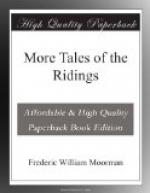“Now then,” Grannie would begin, “if I’m boun’ to tell you t’ tale o’ Janet’s Cove, you mun set yoursels down an’ be whisht. Tak a seat at t’ top o’ bag o’ provand, Kester; Betty and Will can hug chairs to t’ fire, and lile Joe Moon mun sit on t’ end o’ t’ bed.”
Such was Grannie’s arrangement of the seats, while to me, the visitor, was assigned the “lang-settle” on the other side of the fireplace. It was a coign of vantage which I shared with the ancestral copper warming-pan, and from it I could see the whole group. Grannie, bent half-double with rheumatism, was propped up in her bed, with the children grouped around her. She wore, as usual, her white mutch cap and grey shawl. Mittens covered her wrists, and her fingers, painfully swollen with chalk-stones, plied her knitting-needles. Her face was sunken in the cheeks and round her mouth, but her large brown eyes, still full of animation, broad forehead, and high-arched brows gave dignity and even beauty to her pale countenance. On the fire the porridge was warming for the calves’ supper, while suspended from the wooden ceiling was the “bread-flake,” a hurdle-shaped structure across the bars of which hung the pieces of oatcake which were eaten with buttermilk at supper.
“Well, I’ve happen telled you afore,” Grannie began, “that when I were a lile lass I lived up Malham way. My father had a farm close agen Gordale Scar. Eh! but it’s a fearful queer country is yon! Gert nabs o’ rock on all sides wheer nobbut goats can clim, an’ becks flowin’ undergrund an’ then bubblin’ up i’ t’ crofts an’ meadows. On t’ other side frae our steading were a cove that fowks called Janet’s Cove. They telled all maks an’ manders o’ tales about t’ cove an’ reckoned it were plagued wi’ boggards. But they couldn’t keep me out o’ t’ cove for all that; ’twere t’ bonniest spot i’ t’ dale, an’ I nivver gat stalled o’ ramlin’ about by t’ watter-side an’ amang t’ rowans. There were a watterfall i’ t’ cove, wi’ a dark cave behind it, an’ ‘twere all owerhung wi’ eshes an’ hazels.
“One neet I were sittin’ up for my father while fower o’clock i’ t’ morn. ‘Twere t’ day afore Easter Sunday an’ my father were despert thrang wi’ t’ lambin’ ewes. He hadn’t taen off his shoes an’ stockins for more nor a week. He’d doze a bit i’ his chair by t’ fire, an’ then he’d wakken up an’ leet t’ lantern’ an’ gan out to see if aught ailed t’ sheep. He let me bide up for company, an’ so as I could warm him a sup o’ tea ower t’ fire. But when t’ gran’father’s clock strake fower he said I mun away to my bed. He’d tak a turn round t’ croft, an’ then he’d set off wi’ his budget to t’ mistal to milk t’ cows. But I didn’t want to gan to bed. I’d bin sleepin’ off an’ on all t’ neet, an’ I weren’t feelin’ a lile bit tired. So when my father had set off I went to t’ door an’ looked out. My song! but ‘twere a grand neet. T’ mooin were just turned full, an’ were leetin’ up all t’ scars an’ plats o’ meadow; t’ becks were just like silver an’ t’ owd yew-trees that grow on t’ face o’ t’ scar had lang shadows as black as pick. I stood theer on t’ door-sill for mebbe five minutes an’ then I said to misel, I’ll just run down as far as Janet’s Cove afore I gan to bed.’ It were a bit cowd, so I lapped my shawl around my head an’ set off.




